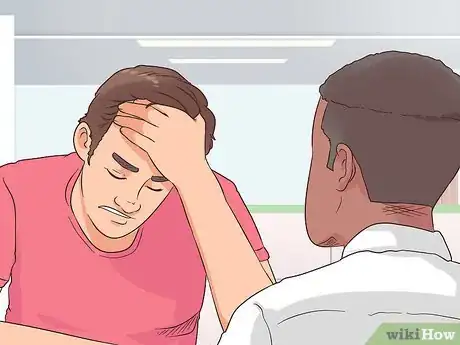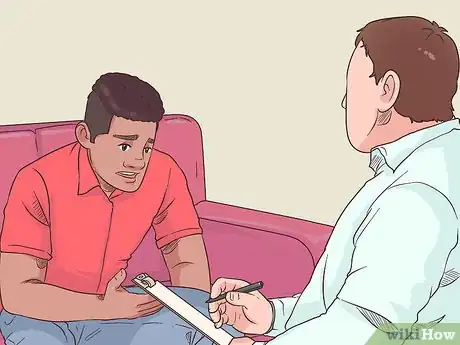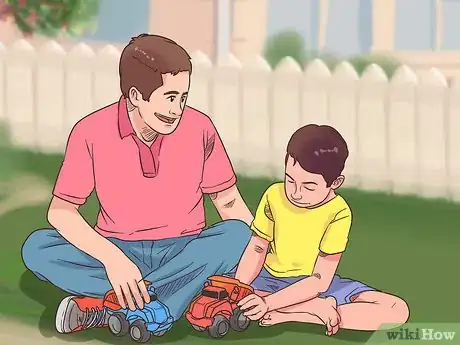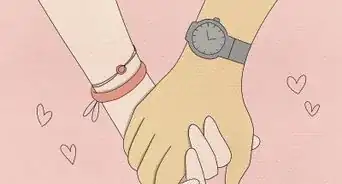This article was co-authored by Trudi Griffin, LPC, MS. Trudi Griffin is a Licensed Professional Counselor in Wisconsin specializing in Addictions and Mental Health. She provides therapy to people who struggle with addictions, mental health, and trauma in community health settings and private practice. She received her MS in Clinical Mental Health Counseling from Marquette University in 2011.
There are 8 references cited in this article, which can be found at the bottom of the page.
This article has been viewed 29,040 times.
Going through a divorce can bring up a lot of emotions, ranging from anger to relief. Because all marriages are different, divorces are unique, too. How you react to your divorce will depend on various factors, like the special circumstances of the breakup, the length of the marriage, and your age among others. The key thing to do is to grieve in a way that feels right to you. If you don't fully grieve, unresolved feelings can affect your health and future relationships. Once you've sorted out your feelings, you can make a fresh start with life after divorce.
Steps
Reacting to Initial Changes
-
1Steer clear of unhealthy coping. Notice if you are using negative strategies to grieve your marriage, like having a lot of casual sex, working too much, drinking, or using drugs. If you spot these patterns, reach out to someone for help before the problem gets worse.[1]
- Men may be more likely to express grief through actions rather than words. This may translate to working too much to avoid an empty apartment, drinking/using drugs to numb your pain, or engaging in high-risk, sex-focused relationships.
-
2Find an emotional outlet that works for you. A lot of emotions may arise during a divorce, like anger, humiliation, regret, or rejection. Identify a unique way to constructively cope with these feelings that doesn't involve unhealthy coping.[2]
- For example, if you are a guitar player in a band, you might compose a song with your buddies that helps communicate how you're feeling. If you're into fitness, you might run or box to help you release tension and stress.
- Understand that you may not have the words to describe the emotions you feel, and that is okay. Men tend to have fewer words to describe their emotions, but emotions don't have to be labeled to be released.
Advertisement -
3Decide on any future arrangements. Many decisions must be made during a divorce and you'll adjust better by making them right away. Work with your spouse or lawyer to determine who gets the family home/assets or how custody will be divided.[3]
- Making these decisions can help you move through your grief. Delaying them may only postpone your ability to heal.
- Document any arrangements or agreements in writing.
- Separate your finances immediately, and document in writing the arrangement you made with your ex-spouse regarding who pays for what and when.
-
4Establish a new normal as soon as possible. Many men feel like they've lost their sense of identity after the spouse and/or children move out and the family structure changes. If this describes your situation, try to regain a sense of stability by creating a new daily or weekly routine for yourself.[4]
- For instance, you might join a new gym, so that you don't bump into your ex at the old one. You might decide to grab breakfast with a few buddies to start your day off with social interaction. You might also purchase furniture or decor to help your kids feel more comfortable when they are visiting your home.
- Figuring out a basic structure for your week can help you feel more in control and sure about yourself.
- Additionally, you should set boundaries with your ex-spouse. Regardless of who left, it's important that you limit contact now and enforce your new, separate life.
Working through Your Feelings
-
1Talk to people you trust. Avoid isolating yourself from those who care about you-- a phenomenon that can be very common with men. Try to reach out to at least one or two people you can confide in. Discuss how difficult the divorce has been or talk about something altogether different.[5]
- If you don't have supportive friends or family, consider looking for divorce support groups in your area or online. These groups can serve as an outlet for you to talk about what's going on.
-
2Get counseling. You may have already been seeing a counselor before your marriage was dissolved, but it can still help to talk to someone one-on-one rather than as a couple. This professional can help you identify thought patterns that perpetuate anger about the divorce and suggest healthy coping strategies to deal with your anger.[6]
- Ask your divorce attorney or family doctor for a recommendation to see a local counselor.
-
3Learn from your mistakes. Take some time to reflect on the role you played in your marriage coming to an end. Can you spot ways you could improve yourself? Write them down.[7]
- For instance, maybe you were a workaholic and never set aside time for your family. Maybe you had trouble really opening up to your spouse about your innermost thoughts and feelings.
- Jotting down your part in the divorce can help empower you to make changes so that future relationships don't suffer for the same reasons.
-
4Try to see the positives. Despite the huge stigma associated with divorce, for some people it can actually lead to a happier life. Look at the circumstances of your divorce and identify ways things have worked out for the best.[8]
- For example, perhaps the split helped you to truly cherish time with your kids, or maybe leaving an incompatible partner gave you a chance to find someone more suited to you.
-
5Avoid rebounding. Men often find a new partner quickly after a marriage ends, but this rebound relationship may not be a healthy partnership. Take some time for yourself before jumping into a new relationship. That way, you're less likely to repeat past mistakes or end up with another incompatible partner.[9]
- Try to avoid filling the space your spouse left in your life with another partner. Instead, set new goals and focus on improving yourself in your free time.
Rebuilding After Divorce
-
1
-
2Develop your hobbies. Reconnect with yourself by taking time for interests and passions that you neglected before. Restart your weekend karate classes, join Toastmasters if you love public speaking, or carve out time for a hike on Saturday mornings.[11]
- Spending time doing things you love will help you to move forward with your life in a positive way.
-
3Access resources if you need them. You might feel overwhelmed about taking on duties that your spouse once took responsibility for. If you're having trouble, seek out help. Most communities offer resources like child care assistance and personal finance workshops that can help you adjust to new roles.[12]
- Consider asking around at your local library to learn about practical classes or services offered in your area.
-
4Establish a routine with your children. Whether you're splitting custody with your ex or only seeing your kids on weekends, you still need to devise some structure when they're in your care. Brainstorm a few ways to make them comfortable when they're at your place.[13]
- Stock your fridge and pantry with kid-friendly foods, set up a space for them to do their homework, or purchase games or movies that you can enjoy together during leisure time.
- You'll also want to come to an agreement with your spouse about parenting strategies, so your kids are receiving relatively consistent rules and discipline.
Expert Q&A
-
QuestionWhy is divorce so painful?
 Moshe Ratson, MFT, PCCMoshe Ratson is the Executive Director of spiral2grow Marriage & Family Therapy, a coaching and therapy clinic in New York City. Moshe is an International Coach Federation accredited Professional Certified Coach (PCC). He received his MS in Marriage and Family Therapy from Iona College. Moshe is a clinical member of the American Association of Marriage and Family Therapy (AAMFT), and a member of the International Coach Federation (ICF).
Moshe Ratson, MFT, PCCMoshe Ratson is the Executive Director of spiral2grow Marriage & Family Therapy, a coaching and therapy clinic in New York City. Moshe is an International Coach Federation accredited Professional Certified Coach (PCC). He received his MS in Marriage and Family Therapy from Iona College. Moshe is a clinical member of the American Association of Marriage and Family Therapy (AAMFT), and a member of the International Coach Federation (ICF).
Marriage & Family Therapist Divorce is painful because it's a loss. However, it's important to remember that divorce is not wrong or shameful. Divorce is not a failure. It means you are leaving a marriage that was no longer healthy and loving. Divorce is a positive step, and can lead to better lives for both you and your ex-spouse.
Divorce is painful because it's a loss. However, it's important to remember that divorce is not wrong or shameful. Divorce is not a failure. It means you are leaving a marriage that was no longer healthy and loving. Divorce is a positive step, and can lead to better lives for both you and your ex-spouse.
References
- ↑ https://www.wevorce.com/blog/for-men-mourning-the-divorce/
- ↑ https://www.helpguide.org/articles/grief/dealing-with-a-breakup-or-divorce.htm
- ↑ https://www.helpguide.org/articles/parenting-family/co-parenting-tips-for-divorced-parents.htm
- ↑ https://www.wevorce.com/blog/for-men-mourning-the-divorce/
- ↑ http://abcnews.go.com/2020/story?id=132639&page=1
- ↑ https://www.huffingtonpost.com/2013/11/03/divorce-stress-_n_4175767.html
- ↑ https://www.helpguide.org/articles/grief/dealing-with-a-breakup-or-divorce.htm
- ↑ https://www.helpguide.org/articles/grief/dealing-with-a-breakup-or-divorce.htm
- ↑ https://goodmenproject.com/featured-content/the-five-things-nobody-told-me-about-post-divorce-rebounding-dg/
- ↑ https://www.health.harvard.edu/newsletter_article/marriage-and-mens-health
- ↑ https://www.helpguide.org/articles/grief/dealing-with-a-breakup-or-divorce.htm
- ↑ https://www.psychologytoday.com/blog/co-parenting-after-divorce/201411/what-makes-successful-co-parenting-after-divorce
- ↑ https://www.helpguide.org/articles/parenting-family/co-parenting-tips-for-divorced-parents.htm








































































